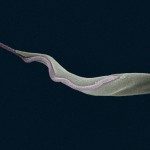Link to Pubmed [PMID] – 2955044
J. Immunol. 1987 Jul;139(2):545-50
Acute Trypanosoma cruzi infection of mice results in a very marked polyclonal activation of B and T lymphocytes, accompanied by high numbers of Ig-secreting PFC and lectin-dependent effector CTL. Treatment of mice with monoclonal anti-L3T4 antibodies from the time of infection (days 0, 4, and 8) completely suppresses the polyclonal PFC response and CTL generation. Treatment of nude mice with antibody does not alter the lipopolysaccharide-induced polyclonal PFC response, and it only modulates the isotypic profile of the PFC response to T. cruzi infection, without reducing its magnitude. Furthermore, antibody-treated, T. cruzi-infected euthymic mice do not develop the typical B cell blastogenic response, but show high numbers of activated Lyt-2+ lymphoblasts in the spleen. These results indicate that effector cell generation in T. cruzi-infected mice is predominantly helper T cell-dependent.
